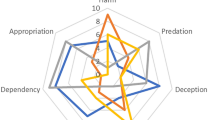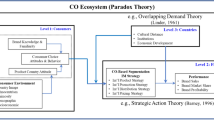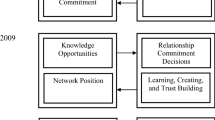Abstract
In this note I discuss Robert Sugden’s original proposal of a market morality of mutual benefit, thoroughly expounded in his recent Community of Advantage. He envisions that jointly aiming at the benefit of all the parties in a transaction—a motivation different from both self-interest and altruism—can really make the market beneficial for everyone. Yet, such intention may not suffice when the transaction entails considerable negative externalities and these are not remedied by government regulation or intervention, or else when markets are not atomistic and some participants are rationed. So I observe that a morality of mutual benefit among transactors should be complemented by another constraint: not to cause significant undue damages to third parties. While recognizing that general adoption of a morality of mutual benefit would be a momentous step forward, in the end I suggest that the gravity of global problems call for walking some steps even beyond mutual benefit.
Similar content being viewed by others
Notes
See Isoni et al. (2016), an experimental investigation he has co-authored.
“For each transaction …mutual benefit among the parties to that transaction provides the motivation for them to transact” (CA, p.3).
Allow me a terminological digression. Are mutual benefit intentions “benevolent”? So I would say, in accordance, for instance, with Nunney (1985). In dealing with biological evolution, he uses the term “benevolence” to indicate “a trait that benefits its carrier but also benefits the neighboring population of the carrier” (p. 214). Sugden, instead, prefers to define benevolence as “willingness to sacrifice one’s own interests to confer benefit on others” (CA, p. 15), in accordance with Smith’s most famous sentence concerning just the baker’s motivation (see also CA, p. 221).
Here too, like in previous works (see Sugden 2002, 2005), he develops on two Smithian concepts drawn from The Theory of Moral Sentiments: fellow-feeling and correspondence of sentiments. Interestingly, he uses them for discussing the benefits of the market, one of the grand themes of The Wealth of Nations.
Sugden calls “intrinsic” the pro-social motivation inherent in intending mutual benefit (CA, p. 278–9). He is also careful in leaving room for another sort of intrinsic motivation, another element of non-instrumentality in a transaction: the sense of efficacy or self-competence that can be derived from accomplishing properly one’s part in the agreement. The example he presents is that of a builder, who “may take pride in exercising his craft” (CA, p. 278). However, he is careful to add that the builder “is not working merely for the fun or challenge of laying bricks, or in the pursuit of excellence in bricklaying”.
I have been surprised by a statement contained in a previous paper by Sugden with Bruni: “[W]e agree with Friedman … that ‘social responsibility’ is not a proper role of business” (2013, p. 157, footnote 5). I guess that this statement may be due to their associating social responsibility with initiatives other than correct business practices towards customers, suppliers, employees, creditors… Another sentence that is found on the same page has also surprised me: “… self-regulation is not an internal practice of the market”. Take ethical codes of conduct, indeed one form of self-regulation. Despite their limits, they announce to all employees the organization’s commitment to a standard of correctness towards—among others—customers and suppliers, in full accordance with the logic of mutual benefit. See also the discussion below regarding externalities.
Interestingly Steven Slutsky proposes a novel type of altruism that he calls “personal action” altruism. It indicates an actor’s “care about the consequences of their own actions on others, even if they do not directly incorporate the welfare of others in their preferences” (2013, p.4). I am reluctant to qualify as moral an attitude that does not include something of this sort.
A typical instance is an entrepreneur considering interrupting the purchase of parts from a work insertion enterprise. Indeed, many Italian Social Cooperatives would not have endured in their endeavour to provide jobs to disadvantaged workers without the good will of some clients; more precisely, without their willingness to help upgrade production, instead of taking the easier route of looking for alternative suppliers.
By the way, Sugden never says that the benefit market participants look for must be self-interested. This is in accordance with his stance that “it is for each individual to judge what counts as his or her benefit” (CA, p.4), and also, let me dare to affirm, with his personal value orientation.
See the strands of literature on the motivating effect of “having an impact” (e.g. Dur and Glazer 2008), or “making a difference” (e.g. Francois 2007), or finding meaning in one’s activity (Cassar and Maier 2018), and also the notion of “action-oriented altruism” (see Francois and Vlassopoulos 2008, and the experimental test in Tonin and Vlassopoulos 2010).
Interesting examples of social entrepreneurs can be found in dedicated sites such as: https://www.schwabfound.org/social-entrepreneur, https://skoll.org/community/awardees/, and https://www.edc-online.org/en/imprese-alias/storie-di-imprese-edc.html.
References
Bruni L, Sugden R (2013) Reclaiming virtue ethics for economics. J Econ Perspect 27(4):141–164
Cassar L, Maier S (2018) Nonmonetary incentives and the implications of work as a source of meaning. J Econ Perspect 32(3):215–238
Dur R, Glazer A (2008) The desire for impact. J Econ Psychol 29:285–300
Francois P (2007) Making a difference. RAND J Econ 38(3):714–732
Francois P, Vlassopoulos M (2008) Pro-social motivation and the delivery of social services. CESifo Econ Stud 54(1):2–54
Isoni A, Brooks P, Loomes G, Sugden R (2016) Do markets reveal preferences or shape them? J Econ Behav Organ 122(1):1–16
Nunney L (1985) Group selection, altruism, and structured-deme models. Am Nat 126(2):212–230
Rabin M (1993) Incorporating fairness into game theory and economics. Am Ec Rev 83:1281–1302
Slutsky S (2013) Personal action altruism. University of Florida, mimeo, Externalities, And Corrective Taxes
Sugden R (2002) Beyond sympathy and empathy: Adam Smith’s concept of fellow-feeling. Econ Philos 18:63–87
Sugden R (2005) Correspondence of Sentiments: an explanation of the pleasure of social interaction. In: Bruni L, Porta PL (eds) Economics & Happiness: Framing the Analysis. Oxford University Press, pp 91–115
Sugden R (2018) The community of advantage: a behavioural economist’s defence of the market. Oxford University Press
Tonin M, Vlassopoulos M (2010) Disentangling the sources of pro-socially motivated effort: a field experiment. J Publ Econ 94:1086–1092
Funding
None.
Author information
Authors and Affiliations
Corresponding author
Ethics declarations
Conflict of interest
The author declare that he have no conflict of interest.
Additional information
Publisher's Note
Springer Nature remains neutral with regard to jurisdictional claims in published maps and institutional affiliations.
The author thanks Ottorino Chillemi, Luca Corazzini, Marta Pancheva, Vittorio Pelligra and the participants in the conference Community of Advantage (Rome, 21–22 November 2019) for providing useful comments. Responsibility for the opinions expressed is remains with the author.
Rights and permissions
About this article
Cite this article
Gui, B. In search of a market morality for making real the “Community of Advantage”: a note on Sugden’s “Principle of Mutual Benefit”. Int Rev Econ 68, 131–140 (2021). https://doi.org/10.1007/s12232-021-00365-1
Received:
Accepted:
Published:
Issue Date:
DOI: https://doi.org/10.1007/s12232-021-00365-1




